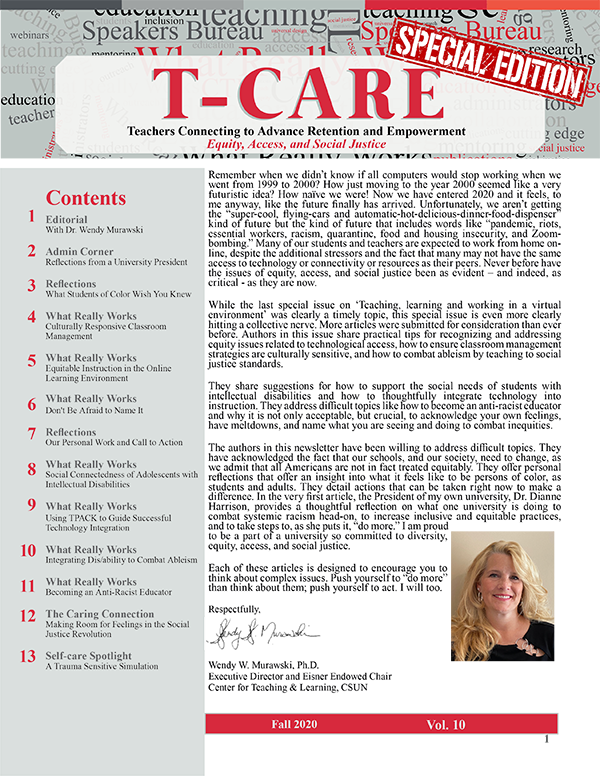View the issue here(.pdf)
Remember when we didn’t know if all computers would stop working when we went from 1999 to 2000? How just moving to the year 2000 seemed like a very futuristic idea? How naïve we were! Now we have entered 2020 and it feels, to me anyway, like the future finally has arrived. Unfortunately, we aren’t getting the “super-cool, flying-cars, and automatic-hot-delicious-dinner-food-dispenser” kind of future but the kind of future that includes words like “pandemic, riots, essential workers, racism, quarantine, food and housing insecurity, and Zoombombing.” Many of our students and teachers are expected to work from home online, despite the additional stressors and the fact that many may not have the same access to technology or connectivity or resources as their peers. Never before have the issues of equity, access, and social justice been as evident – and indeed, as critical - as they are now.
While the last special issue on ‘Teaching, learning and working in a virtual environment’ was clearly a timely topic, this special issue is even more clearly hitting a collective nerve. More articles were submitted for consideration than ever before. Authors in this issue share practical tips for recognizing and addressing equity issues related to technological access, how to ensure classroom management strategies are culturally sensitive, and how to combat ableism by teaching to social justice standards.
They share suggestions for how to support the social needs of students with intellectual disabilities and how to thoughtfully integrate technology into instruction. They address difficult topics like how to become an anti-racist educator and why it is not only acceptable, but crucial, to acknowledge your own feelings, have meltdowns, and name what you are seeing and doing to combat inequities.
The authors in this newsletter have been willing to address difficult topics. They have acknowledged the fact that our schools, and our society, need to change, as we admit that all Americans are not in fact treated equitably. They offer personal reflections that offer an insight into what it feels like to be persons of color, as students and adults. They detail actions that can be taken right now to make a difference. In the very first article, the President of my own university, Dr. Dianne Harrison, provides a thoughtful reflection on what one university is doing to combat systemic racism head-on, to increase inclusive and equitable practices, and to take steps to, as she puts it, “do more.” I am proud to be a part of a university so committed to diversity, equity, access, and social justice.
Each of these articles is designed to encourage you to think about complex issues. Push yourself to “do more” than think about them; push yourself to act. I will too.
Respectfully,
Wendy W. Murawski, Ph.D.
Executive Director and Eisner Endowed Chair
Center for Teaching & Learning, CSUN




